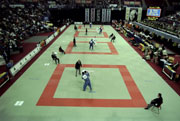| Although Judo is a martial art, its practice and methods are based around gentleness. Giving way to the strength of the opponent, adapting to and using it to your advantage, will achieve victory over the opponent.  “When a stronger man pushes me with all his might, I will be beaten if I simply go against him. If, instead of opposing his pushing I retreat more then he pushes or turn aside the direction of his pushing, he naturally leans forward through his own pushing and loses his balance, and if utilizing his pushing strength I apply a certain technique on him, it is quite possible to make him fall, as he is losing his balance. Sometimes he will fall merely if I turn my body skillfully. This is one simple instance of how, by giving way, a contestant may defeat his opponent. There in lies the principle of gentleness”. “When a stronger man pushes me with all his might, I will be beaten if I simply go against him. If, instead of opposing his pushing I retreat more then he pushes or turn aside the direction of his pushing, he naturally leans forward through his own pushing and loses his balance, and if utilizing his pushing strength I apply a certain technique on him, it is quite possible to make him fall, as he is losing his balance. Sometimes he will fall merely if I turn my body skillfully. This is one simple instance of how, by giving way, a contestant may defeat his opponent. There in lies the principle of gentleness”.
Jigoro Kano, What is Judo, Kodokan, 1947.
Description
 The two judokas (athletes) one in a white and one in a blue uniform (judogi) - compete for five minutes. In Paralympic Judo, the athletes are blind or vision-impaired. They are guided by their touch, sensibility, instinct and sense of balance. A main referee and two more judges arbitrate a Judo contest. All officials are of equal status and calls are decided by vote. The main referee calls all points and penalties while performing the designated hand gestures. The referee gives the signal for the beginning of the match after the two athletes have come into contact. The two judokas (athletes) one in a white and one in a blue uniform (judogi) - compete for five minutes. In Paralympic Judo, the athletes are blind or vision-impaired. They are guided by their touch, sensibility, instinct and sense of balance. A main referee and two more judges arbitrate a Judo contest. All officials are of equal status and calls are decided by vote. The main referee calls all points and penalties while performing the designated hand gestures. The referee gives the signal for the beginning of the match after the two athletes have come into contact.
To win the contest a judoka must score an Ippon (a degree equalling 10 points) by using a successful technique. If none of the judokas completes an Ippon by the end of the game, the winner is the one to have scored the greatest value point.
|

